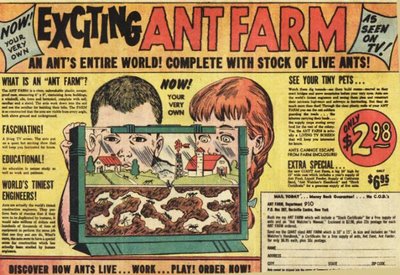 I only heard today that Murray Bookchin (b. 1921) died nearly a month ago. He was one of the most important voices in environmentalism, anarchism and anti-authoritarian politics. Bookchin was the founder of the Social Ecology school of thought.
I only heard today that Murray Bookchin (b. 1921) died nearly a month ago. He was one of the most important voices in environmentalism, anarchism and anti-authoritarian politics. Bookchin was the founder of the Social Ecology school of thought.The best known and most influential modern anarchist intellectual, except perhaps for
Noam Chomsky, Bookchin was a prolific author (
Post-Scarcity Anarchism, 1971;
The Ecology of Freedom, 1982), philosopher, and advocate of
Libertarian Municipalism (which has had an influence on the
Green Movement), as well as head of the
Institute for Social Ecology.
"Murray Bookchin, a writer, teacher and activist who began his political odyssey as a Communist, became an anarchist and then metamorphosed into an influential theorist on ecology, died July 30 at his home in Burlington, Vt. He was 85.
"The cause was complications of a malfunctioning aortic valve, said his daughter, Debbie Bookchin.
"Mr. Bookchin’s environmental philosophy emerged from his leftist background. He argued that capitalism, with what he characterized as dominating hierarchies and insistence on economic growth, necessarily destroyed nature. This put him at odds with ecologists who favored a more spiritual view and with environmentalists dedicated to gradual reform.
"'Capitalism can no more be "persuaded" to limit growth than a human being can be "persuaded" to stop breathing,' he wrote in 'Remaking Society' (1990), one of his 27 books.
"Another book, 'Our Synthetic Environment' (1962), raised issues about pesticides similar to those addressed by Rachel Carson in 'Silent Spring' six months later. A decade earlier, Mr. Bookchin had warned about the dangers of chemicals in food. He also wrote under pseudonyms. His popular book 'Small Is Beautiful' was published under the name Lewis Herber.
"Mr. Bookchin’s writings had their strongest influence on Green Parties in the United States and Europe and on the radical edges of the environmental movement. His emphasis on human society and economic systems put him at odds with “deep ecologists,' who believe that humans have arrogantly usurped their position as just another species to wreak environmental havoc.
"Although he claims to be an anarchist, he writes like a Stalinist thug,' Gary Snyder, the poet and an adherent of deep ecology, said of Mr. Bookchin in an interview with
The Los Angeles Times in 1989.
"Mr. Bookchin, in turn, called deep ecologists 'eco-fascists,' partly because they wanted to limit the population radically ..."
InfoShop NewsTagged: anarchism, environment, philosophy, biography




 Late August, Early September: Freeing the Insects, Japan
Late August, Early September: Freeing the Insects, Japan Ever had trouble with your old man? Be thankful you're not one of the Beach Boys Wilsons.
Ever had trouble with your old man? Be thankful you're not one of the Beach Boys Wilsons. 

 1871 At the Meudon Observatory in France, astronomer Étienne Léopold Trouvelot (1827 - 1895) saw several flying objects high in the atmosphere.
1871 At the Meudon Observatory in France, astronomer Étienne Léopold Trouvelot (1827 - 1895) saw several flying objects high in the atmosphere.

 I don't know whether Australian citizen Jack Thomas is a potential terrorist or not, but Blind Freddie can see that he's had a raw deal.
I don't know whether Australian citizen Jack Thomas is a potential terrorist or not, but Blind Freddie can see that he's had a raw deal.
 1857
1857  I was in a dentist's chair this morning, but not for long.
I was in a dentist's chair this morning, but not for long. On the steam wireless I heard Yank rich guy
On the steam wireless I heard Yank rich guy 
 1883 On the Indonesian island of Rakata, the volcano Krakatoa (real name, Krakatau) erupted with one of the biggest volcanic explosions ever in human history (some say Santorini’s eruption in 1628 BCE was three times as forceful. Krakatoa was heard over 7.5 per cent of the earth’s surface).
1883 On the Indonesian island of Rakata, the volcano Krakatoa (real name, Krakatau) erupted with one of the biggest volcanic explosions ever in human history (some say Santorini’s eruption in 1628 BCE was three times as forceful. Krakatoa was heard over 7.5 per cent of the earth’s surface). A propos yesterday's post about Dylan,
A propos yesterday's post about Dylan,  1778 The last pagan sacrifice of a bull to be conducted publicly in the Celtic world, was performed on the island of Eilean Maree (Maelrubha, formerly Eilean a Mhor Righ – Island of the Great King), in Loch Maree, a lake in the Ross and Cromarty region of the Scottish Highlands.
1778 The last pagan sacrifice of a bull to be conducted publicly in the Celtic world, was performed on the island of Eilean Maree (Maelrubha, formerly Eilean a Mhor Righ – Island of the Great King), in Loch Maree, a lake in the Ross and Cromarty region of the Scottish Highlands.  So, we were sold a pup with Pluto.
So, we were sold a pup with Pluto.  Legend derides 20 years of 'atrocious' recordings - including his own
Legend derides 20 years of 'atrocious' recordings - including his own


 I only heard today that
I only heard today that 

 WASHINGTON (AP)— "A mix of bacteria-killing viruses can be safely sprayed on cold cuts, hot dogs and sausages to combat common microbes that kill hundreds of people a year, federal health officials said Friday in granting the first-ever approval of viruses as a food additive.
WASHINGTON (AP)— "A mix of bacteria-killing viruses can be safely sprayed on cold cuts, hot dogs and sausages to combat common microbes that kill hundreds of people a year, federal health officials said Friday in granting the first-ever approval of viruses as a food additive.



 Patti Smith has recorded a new song: 'Qana'.
Patti Smith has recorded a new song: 'Qana'.


 The Roman vintage began on this day, a festival held in honour of
The Roman vintage began on this day, a festival held in honour of  1590 John White, the governor of the Colony of Roanoke in America, returned from a supply trip to England to find the settlement entirely deserted of all 117 people, including the first white child born in the country, his granddaughter Virginia Dare, whose third birthday it was.
1590 John White, the governor of the Colony of Roanoke in America, returned from a supply trip to England to find the settlement entirely deserted of all 117 people, including the first white child born in the country, his granddaughter Virginia Dare, whose third birthday it was.


 "That's because Osama got what he wanted. There's no mystery about what Al Qaeda was after. Like everyone from the Girl Scouts to Bono, Osama put his wish on his web site. He had a single demand: 'Crusaders out of the land of the two Holy Places.' To translate: get US troops out of Saudi Arabia.
"That's because Osama got what he wanted. There's no mystery about what Al Qaeda was after. Like everyone from the Girl Scouts to Bono, Osama put his wish on his web site. He had a single demand: 'Crusaders out of the land of the two Holy Places.' To translate: get US troops out of Saudi Arabia. Tutbury hunters' procession, Middle Ages (Aug 15 - 16)
Tutbury hunters' procession, Middle Ages (Aug 15 - 16)


 From
From  The maiden speech of Australia's current Prime Minister and war criminal, John Howard, was delivered to Parliament on September 26, 1974.
The maiden speech of Australia's current Prime Minister and war criminal, John Howard, was delivered to Parliament on September 26, 1974. In Roman mythology, Vertumnus (Vortumnus, Vertimnus) was the god of seasons, change and plant growth, as well as gardens and fruit trees. Like the seasons and the fruit trees, Vertumnus was a shapeshifter.
In Roman mythology, Vertumnus (Vortumnus, Vertimnus) was the god of seasons, change and plant growth, as well as gardens and fruit trees. Like the seasons and the fruit trees, Vertumnus was a shapeshifter.



 1963 History’s most famous heist, the Great Train Robbery took place in England. A 16-member gang stole 2,631,784 pounds – worth over 26 million pounds ($AU75.5 million) today – in used bank notes which were on their way back to the Bank of England for burning.
1963 History’s most famous heist, the Great Train Robbery took place in England. A 16-member gang stole 2,631,784 pounds – worth over 26 million pounds ($AU75.5 million) today – in used bank notes which were on their way back to the Bank of England for burning. 1560 Elizabeth Bathory serial killer (d. 1614).
1560 Elizabeth Bathory serial killer (d. 1614). Only fifteen years ago today,
Only fifteen years ago today,  1936 "
1936 " We discussed in the Book of Days on
We discussed in the Book of Days on 


 1100 England’s King William Rufus (William II of England; b. c. 1056) was killed when shot through the chest by an arrow while hunting.
1100 England’s King William Rufus (William II of England; b. c. 1056) was killed when shot through the chest by an arrow while hunting. Because when I went outside onto the beach last night and saw an unbelievably bright shooting star -- like a fireworks rocket -- to the south of the Milky Way, I thought I'd post about the Games of Lugh today. Spend some time outside tonight and see what flashes by.
Because when I went outside onto the beach last night and saw an unbelievably bright shooting star -- like a fireworks rocket -- to the south of the Milky Way, I thought I'd post about the Games of Lugh today. Spend some time outside tonight and see what flashes by.






